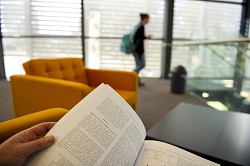Copyright for students
 The Copyright Act has a section called 'fair dealing for research and study'. Find out what is protected by copyright, your obligations to comply with the law, and how to decide which material can be used for your studies.
The Copyright Act has a section called 'fair dealing for research and study'. Find out what is protected by copyright, your obligations to comply with the law, and how to decide which material can be used for your studies.
Types of copyright
A person can create various 'works' which are protected by copyright:
- literary works (books, letters, articles, term papers, computer software programs)
- dramatic works (plays, filmscripts, scenarios)
- musical works (musical scores, music that is written down)
- artistic works (photos, paintings, drawings, animations, diagrams)
Audiovisual items (films, music recordings) are known as 'subject natter'.
What and how much can you copy?
The Copyright Act states that you may copy 'a reasonable portion' of a work for your study purposes.
You CAN copy
- 10% of the number of pages, one chapter of a book, or journal articles (print or digital)
- Pictures, animations, graphics and diagrams in publications
- A 'reasonable portion' of audiovisual items (NOTE: This is not clearly defined, so you need to be careful)
- Copies of computer software programs you have purchased (for backup, study, error correction, compatibility or security testing)
- A CD, record or audio/video cassette you own, for your own private use
You CAN'T copy
- A CD or DVD you do not own, which is copyright protected
Do you like to use images to illustrate and enliven your content? Here are some links to public domain image banks:
Sharing and downloading
Format-shifting of music
There are conditions on the format-shifting of music which include:
- the copy you make must be only for your own private and domestic use,
- the copy you make must be for use with a playing device that you own,
- a copy must not be made from a 'podcast' of a radio broadcast or similar program (unless the podcast is licenced for private use),
- you cannot sell, swap, lend or give away to someone else (but you can loan it to a member of your family or household) a copy you make,
- you cannot keep any copy made from the original if you dispose of, give away, sell or swap the original copy of a sound recording,
- uploading a copy of a song to the internet is not allowed.
Sharing and downloading music, movies and software
There are many websites offering free downloads of music, movies and/or software, or offering downloads for a small fee, and most of these sites may not be offering legal copies.
- Always check that the website or service is the authorised online distributor i.e. iTunes, JB Hi-Fi, Bigpond etc. or that the file is a creative commons or other licenced work.
- Do not use KaZaa or other file-trading or peer-to-peer software, including BitTorrent, to share copyrighted software, music or movie files.
If you use University equipment, including the fixed and wireless networks, to download and share music, movies, software, books etc for unauthorised purposes you may face disciplinary action and suspension of access to computer facilities.
Resources
- Copyright 101 - very useful copyright guide by Glen Clancy - upstart magazine 1 March 2010
- Copyright in a thesis
- Use of Computer Facilities Statute 2009 [PDF 64KB]